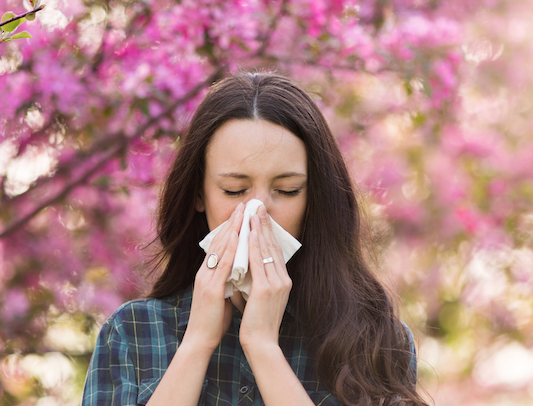11 Apr Spring Allergies…What Are They Exactly?
April showers bring May flowers and…allergies. Do you know what you are allergic to? If not, we can help. How can you determine if your symptoms are allergies or something else? Learn how to prepare for the onslaught of spring and how testing and changes in nutrition can help boost your immunity levels.
Understanding what Allergy Season is All About
Allergies can make you really miserable. But, what exactly are they?
“An allergy is when your immune system reacts to a foreign substance, called an allergen. It could be something you eat, inhale into your lungs, inject into your body or touch. This reaction could cause coughing, sneezing, itchy eyes, a runny nose and a scratchy throat. In severe cases, it can cause rashes, hives, low blood pressure, breathing trouble, asthma attacks and even death.
There is no cure for allergies. You can manage allergies with prevention and treatment. More Americans than ever say they manage allergies. It is among the country’s most common, but overlooked, diseases,” the Asthma and Allergy and Foundation of America (AAFA) said.
How Many People Are Affected by Spring Allergies?
Draw strength from knowing that if you suffer from spring allergies, you are not alone!
“More than 50 million Americans have experienced various types of allergies each year. Allergies are the 6th leading cause of chronic illness in the U.S.,” the AAFA said.
Watch out for the following signs and symptoms to know if you are suffering from allergies and then give us a call to get help–there is no need to stay uncomfortable!
Spring Allergies and Their Symptoms
Do you find yourself sneezing, chasing a runny/stuffy nose, or pinned down under the weight of head and chest congestion. What about swollen lymph nodes, itchy or watery eyes, fatigue, digestive or bowel issues coughing, and/or aching? If these symptoms sound familiar chances are high that your immune system is reacting to an allergen (or allergens) in your area.
Spring and summer months can be especially challenging for allergy sufferers since it is the time when flowers, trees, weeds and more start to come up from their long winter slumber.
Tree pollination starts in February, followed by grass pollination later on in spring. Spring showers feed molds and similar allergens so they are more abundant, reports the American College of Allergy, Asthma & Immunology.
When Indoor and Outdoor Allergies are to Blame
Sometimes, the allergen that you may be reacting to is closer to home. Indoor AND outdoor allergies can trigger sinus swelling, hay fever and nasal allergies. Most with allergies often have more than one type that is causing them issues. The most common indoor/outdoor allergy triggers are: tree, grass and weed pollen, mold spores, dust mites, cockroaches, and cat, dog and rodent dander.
How Your Immune System Reacts
Your immune system is highly sensitive to foreign invaders to help fend off bacteria attacks. So what does it do when it encounters an allergen?
“When a harmless substance such as dust, mold, or pollen is encountered by a person who is allergic to that substance, the immune system may overreact. It may produce antibodies that attack the allergen. These can cause wheezing, itching, runny nose, watery or itchy eyes, and other symptoms,” said the University of Rochester Medical Center.
Getting help your immune system so it doesn’t trigger these unwanted side effects is of prime importance for restoring you to your prior health and well-being.
Testing Can Help You Get Better Treatment
“For many people, avoiding allergens and taking over-the-counter medications is enough to ease symptoms. But if your seasonal allergies are still bothersome, don’t give up. A number of other treatments are available.
If you have bad seasonal allergies, your doctor may recommend that you have skin tests or blood tests to find out exactly what allergens trigger your symptoms. Testing can help determine what steps you need to take to avoid your specific triggers and identify which treatments are likely to work best for you,” the Mayo Clinic said.
Call for an Allergy Testing Consultation
If you think you have an allergy, let us help you–through testing–to know for sure. When you know your body can’t tolerate something, you can make adjustments to stay feeling your best. Some allergies can also be treated with immunotherapy. To make an appointment, or to learn more about our state of the art facility and team, contact us at (720) 507-0080 today to schedule your free consultation at our Broomfield chiropractic office!


